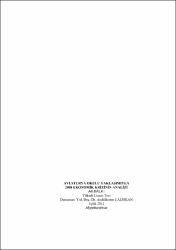| dc.contributor.advisor | Çalışkan, Abdülkerim | |
| dc.contributor.author | Balkı, Ali | |
| dc.date.accessioned | 2015-03-18T07:12:34Z | |
| dc.date.available | 2015-03-18T07:12:34Z | |
| dc.date.issued | 2012 | |
| dc.date.submitted | 2012 | |
| dc.identifier.uri | http://hdl.handle.net/11630/2983 | |
| dc.description.abstract | Temel yapıların, değerlerin ve normların öngörülemeyen ve beklenmedik gelişmeler sonucunda olumsuz yönde etkilenmesi anlamına gelen ‘kriz’ kelimesi; sosyal bilimlerde özellikle de son 25-30 yıl içerisinde çok sık tekrar edilen bir kavram haline gelmiştir. Her iktisadi akım ekonomik krizlere farklı perspektiflerden bakmaktadır. 2007 yılında Amerika Birleşik Devletleri’nde (ABD) emlak piyasasında başlayan mortgage krizi, 2008 yılı Eylül ayından itibaren tüm dünyada hissedilmeye başlamış ve Küresel Kriz niteliği kazanmıştır.
Avusturya Okulu, küresel krizi önceden tahmin etmesi ve Avusturya İktisadi Dalgalanmalar Teorisi (Avusturyacı Konjonktür Teorisi) ışığında küresel krizi analiz ederek, bu teorik çerçevede getirdiği çözüm önerileri bakımından büyük önem arz etmektedir.
Bu çalışma, küresel krizi önceden tahmin eden Avusturya Okulu’nun küresel krizi; ortaya çıkışı, nedenleri ve sonuçları ile birlikte açıklayıp açıklayamadığını, küresel krize getirmiş olduğu çözüm önerilerinin ne derece tutarlı olduğunu ve asıl küresel krizin baş gösterdiği ABD’nin küresel krize karşı almış olduğu önlemlerin Avusturya Okulu’nun çözüm önerileri ile bağdaşıp bağdaşmadığını ortaya koyma amacına yönelik olarak yapılmıştır. | en_US |
| dc.description.abstract | The term “crisis”, which means the fundamental structures’, values’ and norms’ being adversely affected as a result of unforeseeable and unexpected occurrences, has become a much frequently used term within the last 25 or 30 years, particularly in social sciences. Each economic movement treats economic crises from a different point of view. The mortgage crisis which began in the estate market in the United States of America (USA) began to have perceptible effects throughout the world since September, 2008 and took on the form of a Global Crisis.
By foreseeing the global crisis and analyzing the global crisis in the light of Austrian Economic Fluctuations Theory (Austrian Conjuncture Theory), The Austrian School has become significant in terms of the solutions it recommends within this theoretical framework.
This study has been carried out with a view to reveal whether the Austrian School, which foresaw the global crisis, can explain the global crisis in terms of its emergence, reasons and consequences; to what extent its suggested solutions to the global crisis are consistent and whether the measures taken by the USA, where the crisis actually emerged are in compliance with the Austrian School’s suggested solutions. | en_US |
| dc.language.iso | tur | en_US |
| dc.publisher | Afyon Kocatepe Üniversitesi, Sosyal Bilimler Enstitüsü | en_US |
| dc.rights | info:eu-repo/semantics/openAccess | en_US |
| dc.subject | Küresel Kriz | en_US |
| dc.subject | Avusturya Okulu | en_US |
| dc.subject | Avusturya İktisadi Dalgalanmalar Teorisi | en_US |
| dc.title | Avusturya Okulu Yaklaşımıyla 2008 Ekonomik Krizinin Analizi | en_US |
| dc.title.alternative | Analysis of the Economic Crisis in 2008 With the Approach of Austrian School | en_US |
| dc.type | masterThesis | en_US |
| dc.department | Afyon Kocatepe Üniversitesi, Sosyal Bilimler Enstitüsü, Maliye Anabilim Dalı | en_US |
| dc.authorid | TR221658 | en_US |
| dc.relation.publicationcategory | Tez | en_US |



















